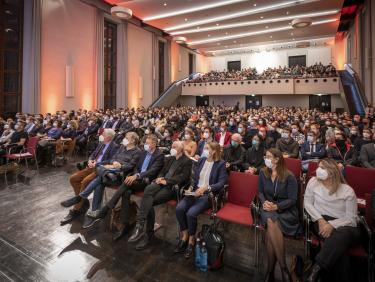Apocalypse, Catastrophe, and the End of History. Žižek at the Start of the End
The Käte Hamburger Centre for Apocalyptic and Post-Apocalyptic Studies celebrated its official inauguration on the 14th of October to an overwhelming response. Not only was the event entirely booked out to maximum capacity, with a total of 675 guests, but the live stream, in which the entire evenings events were filmed, has been (at time of publication) viewed the staggering number of 10,500 times. Prof. Dr. Thomas Meier, one half of the founding directors of CAPAS, commented that the event “was overwhelmingly well received by our colleagues from Heidelberg and abroad as well as by students and the broader public”; mirroring the power of intellectual academia and advanced research in disseminating societal spheres.
The inaugural ceremony was opened by the Rector of Heidelberg University Prof. Dr. Bernhard Eitel, followed by a short speech by Thomas Rachel the Parliamentary State Secretary for the Federal Ministry of Education and Research. Felicitas Loest, Managing Director of CAPAS, and the two directors Prof. Dr. Robert Folger, and Prof. Dr. Thomas Meier introduced the Centre, welcomed the guests, as well as those watching at home, and introduced the keynote speaker: the infamous Slovenian philosopher Slavoj Žižek.
Žižek took the bull by the horns exploring how we are, currently, at a crossroads or rather, to be more precise, Lacan’s Point de capiton of catastrophe; revealing that we are faced with a plethora of catastrophes rather than a single, isolated threat. His primary argument was that “the struggle against vaccination is also a displaced [and] mystified form of class struggle against those in power” followed by the ominous, and nonetheless crucial, question: “what kind of apocalypse is announced in this plurality of catastrophes that today pose a threat to all of us?” From this standpoint of catastrophic intersectionality, Žižek revealed that it is the conglomeration of catastrophes which uncovers, in a true revelatory manner, the/an apocalypse. As Žižek guided the avid listeners on an inquisitive expedition, his first point of call was the AI apocalypse, or, rather, the prospect of total digital control in which we see our relationship to the very fabric of reality begin to tear and we “effectively enter a post-human state”.'
The apocalyptic image of unbridled totalitarian control leads us, aptly, to another apocalyptic end: “the long-foretold end of philosophy” where we are faced with the distinct divisions of the scientific and the transcendental which, according to Žižek, “do not complement each other, they are mutually exclusive, but the immanent insufficiency of each of them opens up the space for the other”; revealing the interdependency, clashes, as well as necessity of philosophy and science.

Drawing on the ‘usual suspects’ such as Hegel and Schelling, Žižek brought into question the division as well as dimensions of truth and derangement or, better said, untruth or madness in these trying and obscure times as Germany struggles with vaccination rates, the rise of COVID-19 cases, and an intensifying of polarised political assertions and beliefs. Žižek aptly pointed out, however, that for Hegel madness is not an illness, sickness, or something to be cured. It is, on the other hand, “to be human” or at the very least being human is to have the potential to be mad.


Elaborating on the argument he has made in previous works (Event 2014, Pandemic! 2020, and Pandemic! 2 2021 to name a few) Žižek then explored how a number of apocalyptic ends have already happened; bringing to light the inherent problem of temporality. “We hear again and again”, states Žižek, “that we are at the end of history”. However, for the Slovenian philosopher “we passed from catastrophe to apocalypse and then back to catastrophe” suggesting that today “we live in an era that is best characterised as the end of the end”.
This led Žižek to explore ecological ends and, drawing on fellow Slovenian philosopher Alenka Zupančič, stating that “the ultimate proof that the ecological apocalypse has already happened is that it has already been renormalized”; as the debate around climate change continues to focus on how we accommodate ourselves in the prospect of the continuing climate catastrophe. Žižek, in turn, thus condemned deep ecologists declaring that “even the most modest deep ecologists are the most arrogant” as they presume that we humans are the so-called ‘general manager’ of our environmental surroundings including the animals and ecosystems that exist in said surroundings.
It was this point in the evening when Žižek turned to the bereft figure of Sophocles’ Antigone in her search for a proper burial for her brother. The archaic image that has haunted the literary world for time immemorial was interpreted anew as a pre-law patron; a figure that confronts us with an act of ultimate resistance with her questioning conjunction ‘but’. Her act is the law of exception and as “Antigone herself devalues the preceding order of customs, reducing it to a chaos of rotting corpses” she thus acts as the dialectic leading lady that we could all learn from. Antigone’s act of demanding a proper burial for her brother, while simultaneously, letting all the other bodies rot is an act of “annihilating a previous order, denouncing it as a false mask of chaos”.

Showing true Marxist compassion, Žižek, after his powerful presentation, stayed to patiently sign the books of many starry-eyed students who clambered over each other in their haste to have their books signed; followed by the reception in the lobby and terrace of the New University building. As the evening came to a climactic close, the general feeling was that the evening was entertaining, inclusive, and gave an insightful overview of what director Prof. Dr. Robert Folger expressed as “the tone for the CAPAS agenda: bringing top-notch researchers to Heidelberg to work on a topic that resonates with colleagues here, abroad, and also with the broader public”.